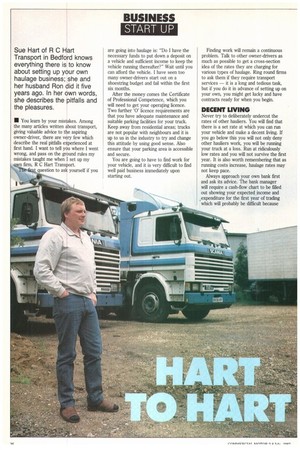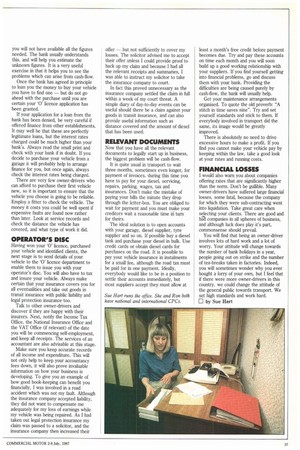Sue Hart of R C Hart Transport in Bedford knows
Page 38

Page 39

If you've noticed an error in this article please click here to report it so we can fix it.
everything there is to know about setting up your own haulage business; she and her husband Ron did it five years ago. In her own words, she describes the pitfalls and the pleasures.
IN You learn by your mistakes. Among the many articles written about transport, giving valuable advice to the aspiring owner-driver, there are very few which describe the real pitfalls experienced at first hand. I want to tell you where [went wrong, and pass on the ground rules my mistakes taught me when I set up my firm, R C Hart Transport.
question to ask yourself if you
are going into haulage is: "Do I have the necessary funds to put down a deposit on a vehicle and sufficient income to keep the vehicle running thereafter?" Wait until you can afford the vehicle. I have seen too many owner-drivers start out on a shoestring budget and fail within the first six months.
After the money comes the Certificate of Professional Competence, which you will need to get your operating licence. Two further '0' licence requirements are that you have adequate maintenance and suitable parking facilities for your truck. Keep away from residential areas; trucks are not popular with neighbours and it is up to us in the industry to try and change this attitude by using good sense. Also ensure that your parking area is accessible and secure.
You are going to have to find work for your vehicle, and it is very difficult to find well paid business immediately upon starting out. Finding work will remain a continuous problem. Talk to other owner-drivers as much as possible to get a cross-section idea of the rates they are charging for various types of haulage. Ring round firms to ask them if they require transport services — it is a long and tedious task, but if you do it in advance of setting up on your own, you might get lucky and have contracts ready for when you begin.
DECENT LIVING
Never try to deliberately undercut the rates of other hauliers. You will find that there is a set rate at which you can rim your vehicle and make a decent living. If you go below this you will not only deny other hauliers work, you will be running your truck at a loss. Run at ridiculously low rates and you will not survive the first year. It is also worth remembering that as running costs increase, haulage rates may not keep pace.
Always approach your own bank first and ask its advice. The bank manager will require a cash-flow chart to be filled out showing your expected income and ,expenditure for the first year of trading which will probably be difficult because you will not have available all the figures needed. The bank usually understands this, and will help you estimate the unknown figures. It is a very useful exercise in that it helps you to see the problems which can arise from cash-flow.
Once the bank has agreed in principle to loan you the money to buy your vehicle you have to find one — but do not go ahead with the purchase until you are certain your '0' licence application has been granted.
If your application for a loan from the bank has been denied, be very careful if offered finance from other establishments. It may well be that these are perfectly legitimate loans, but the interest rates charged could be much higher than your bank's. Always read the small print and check with your bank if in doubt. If you decide to purchase your vehicle from a garage it will probably help to arrange finance for you, but once again, always check the interest rates being charged.
There are very few owner-drivers who can afford to purchase their first vehicle new, so it is important to ensure that the vehicle you choose is going to be reliable. Employ a fitter to check the vehicle. The money it costs you could be well spent if expensive faults are found now rather than later. Look at service records and check the distance the vehicle has covered, and what type of work it did.
OPERATOR'S DISC
Having won your '0' licence, purchased your vehicle and identified clients, the next stage is to send details of your vehicle to the '0' licence department to enable them to issue you with your operator's disc. You will also have to tax and insure your vehicle. Always make certain that your insurance covers you for all eventualities and take out goods in transit insurance with public liability and legal protection insurance too.
Talk to other owner-drivers and discover if they are happy with their insurers. Next, notify the Income Tax Office, the National Insurance Office and the VAT Office (if relevant) of the date you will be commencing self-employment, and keep all receipts. The services of an accountant are also advisable at this stage.
Make sure you keep accurate records of all income and expenditure. This will not only help to keep your accountancy fees down, it will also prove invaluable information on how your business is developing. To give you an example of how good book-keeping can benefit you financially, I was involved in a road accident which was not my fault. Although the insurance company accepted liability, they did not want to compensate me adequately for my loss of earnings while my vehicle was being repaired. As I had taken out legal protection insurance my claim was passed to a solicitor, and the insurance company then increased their offer — but not sufficiently to cover my losses. The solicitor advised me to accept their offer unless I could provide proof to back up my claim and because I had all the relevant receipts and summaries, I was able to instruct my solicitor to take the insurance company to court.
In fact this proved unnecessary as the insurance company settled the claim in full within a week of my court threat. A simple diary of day-to-day events can be useful should there be a claim against your goods in transit insurance, and can also provide useful information such as distance covered and the amount of diesel that has been used.
RELEVANT DOCUMENTS
Now that you have all the relevant documents to legally start up in business, the biggest problem will be cash-flow.
It is quite usual in transport to wait three months, sometimes even longer, for payment of invoices. iduring this time you have to pay for your diesel, servicing, repairs, parking, wages, tax and insurances. Don't make the mistake of paying your bills the minute they drop through the letter-box. You are obliged to wait for payment and you must make your creditors wait a reasonable time hi turn for theirs.
The ideal solution is to open accounts with your garage, diesel supplier, tyre supplier and so on. If possible buy a diesel tank and purchase your diesel in bulk. Use credit cards or obtain diesel cards for purchases on the road. It is possible to pay your vehicle insurance in instalments for a small fee, although the road tax must be paid for in one payment. Ideally, everybody would like to be in a position to settle their accounts immediately, but most suppliers accept they must allow at least a month's free credit before payment becomes due. Try and pay these accounts on time each month and you will soon build up a good working relationship with your suppliers. If you find yourself getting into financial problems, go and discuss them with your bank. Providing the difficulties are being caused purely by cash-flow, the bank will usually help.
Get your maintenance arrangements organised. To quote the old proverb: "A stitch in time saves nine". Try and set yourself standards and stick to them. If everybody involved in transport did the same, its image would be greatly improved.
There is absolutely no need to drive excessive hours to make a profit. If you find you cannot make your vehicle pay by keeping within the law, take a good look at your rates and running costs.
FINANCIAL LOSSES
I would also warn you about companies offering rates that are significantly higher than the norm. Don't be gullible. Many owner-drivers have suffered large financial losses, some fatal, because the company for which they were sub-contracting went into liquidation. Take great care when selecting your clients. There are good and bit companies in all spheres of business, and although luck does play it's part, commonsense should prevail.
You will find that being an owner-driver involves lots of hard work and a lot of worry. Your attitude will change towards the number of bank holidays in a year, people going out on strike and the number of tea-breaks taken in factories. Indeed, you will sometimes wonder why you ever bought a lorry of your own, but I feel that if there were more owner-drivers in this country, we could change the attitude of the general public towards transport_ We set high standards and work hard. El by Sue Hart




















































































